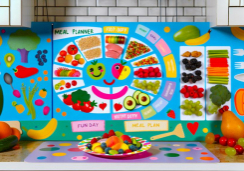Transform Your Health With Diabetic-Friendly Meal Planning
Just as Odysseus navigated the unpredictable waters of the Mediterranean, you're embarking on your own epic journey to manage diabetes through smart meal planning.
You've heard it time and again: food is your medicine.
And in your quest, it's not just about avoiding the sirens' call of sugary treats; it's about transforming your daily meals into a balanced tapestry that supports your health.
You know the basics—mixing healthy carbs, proteins, and fats—but the devil's in the details.
As you stand at the helm, ready to chart a course towards better health, you're faced with a sea of choices: which foods to select, how to maintain variety, and the best ways to prep for the week.
But don't worry, you won't be navigating these waters alone.
Imagine the possibilities when every meal brings you closer to your goal, without the dread of monotonous diets or the fear of glucose spikes.
Stay with me as we unveil the strategies that can turn your kitchen into a lighthouse guiding you to better health.
Assessing Nutritional Needs
To effectively manage your diabetes, it's crucial to evaluate your current diet and identify specific nutritional needs tailored to your age, gender, weight, activity level, and blood sugar control objectives. Consulting with a registered dietitian can be instrumental in creating a personalized meal plan that addresses these factors. Nutrition therapy, a cornerstone of diabetes management, involves a careful selection of nutritious foods and the understanding of portion control, particularly the amount of carbohydrates you consume.
A diet rich in complex carbohydrates, such as whole grains, legumes, and vegetables, can help you maintain steady blood sugar levels. The diabetes plate method is an easy-to-use tool that helps you build a healthy diet by visually dividing your plate to include a balance of protein, starches, and non-starchy vegetables. Remember, the quality of your diet goes hand in hand with physical activity to optimize your health.
Regularly monitoring and assessing the impact of your dietary choices on your blood sugar levels is essential. Adjustments to your meal planning may be necessary to ensure effective diabetes management. Through a patient-centric approach, you can transform your health with a diet plan that supports your unique needs and promotes control over your diabetes.
Building Balanced Meals
When building balanced meals for diabetes management, it's essential to incorporate a variety of foods that support blood sugar control and overall health.
Start by adopting the plate method for your diabetes meal plan. Fill half of your plate with non-starchy vegetables, a quarter with lean protein such as fish or poultry, and the remaining quarter with whole grains or other healthy carbohydrates. This approach helps manage blood glucose levels effectively.
Monitoring your carbohydrate intake is vital, as it directly affects blood sugar levels. Opt for healthy carbs like fruits, veggies, whole grains, and legumes. These foods have a low glycemic index, which means they've a lesser impact on your blood sugar.
Balance these with good fats from avocados and nuts, and don't forget fiber-rich options to aid in blood sugar regulation.
Carbohydrate Counting Basics
Mastering the basics of carbohydrate counting can empower you to manage your diabetes more effectively by aligning your insulin dosage with your carbohydrate intake. This crucial component of your meal plan plays a pivotal role in stabilizing your glucose levels. By understanding the effect on blood sugar that comes from different types of carbohydrates, you can make informed choices about the Diabetes Food that's right for you.
- *Check food labels* to determine the serving size and amount of carbs per serving.
- *Opt for healthful carbs* like whole grains, vegetables, and legumes to better manage blood glucose.
- *Tailor your intake* based on activity levels and medication, keeping an eye out for low-carb options that fit into your eating plan.
When you pay attention to carbohydrate counting basics, you become more adept at predicting how your body will respond to the foods you eat. It's not just about the quantity of carbs; it's also about the quality and how they fit into your overall dietary pattern. By implementing a structured approach to your eating plan, you can achieve better control over your diabetes, making every meal a step towards a healthier you.
Planning Grocery Shopping
Having mastered carbohydrate counting, you're now equipped to create a grocery list that supports your diabetic meal plan. Meal planning is essential, especially for adults with diabetes, to maintain a balanced diet and control blood sugar levels. Start with a well-thought-out meal plan that includes healthy meals for the week. This will help you pinpoint exactly which foods based on your diabetes diet you should purchase.
Prioritize healthy carbohydrates like fruits and vegetables, as they're the best foods to form the foundation of your grocery list. Whole grains, such as brown rice, quinoa, and whole grain bread, should also be included. When selecting proteins, opt for lean options like chicken, fish, or plant-based alternatives. Don't forget to add items like water or unsweetened beverages to stay hydrated without adding extra sugar to your diet.
Consult with your health care provider or a registered dietitian to understand portion sizes and individual dietary needs. This will ensure that your shopping list reflects the requirements of your specific diabetes management plan. Remember, the foods you choose will greatly impact the effectiveness of your meal planning, so use resources and tools available to you for guidance and to make informed choices at the grocery store.
Incorporating Physical Activity
To effectively manage your diabetes and enhance your overall health, it's crucial to weave regular physical activity into your daily routine. As part of comprehensive diabetes care, staying active plays a pivotal role in maintaining optimal blood glucose levels. For people with type 1 or type 2 diabetes, regular exercise can improve the body's ability to use insulin and help control your blood sugar.
Imagine the impact of these activities on your health:
- Taking a brisk walk around your neighborhood, feeling your heart rate rise and your muscles engage, promoting better glucose control.
- Diving into a cool pool for some laps, experiencing the resistance of the water that helps keep your blood sugar levels steady.
- Riding a bike through a scenic trail, the wind in your hair, as each pedal helps drive your weight loss goals and reduces your risk of heart disease.
Frequently Asked Questions
What Should a Diabetic Meal Plan Look Like?
Your diabetic meal plan should balance portions, focus on nutrient density, and include healthy fats. Practice carbohydrate counting for glycemic control, moderate portion sizes, and choose sugar substitutes and fiber-rich snacks. Use the plate method wisely.
What Is the Best Eating Schedule for Diabetics?
You should tailor your eating schedule for consistent meal frequency, focusing on nutrient balance, portion control, and monitoring blood sugar. Prioritize hydration, understand glycemic index, and adjust snack timing to your insulin response.
Is There a Free App for Diabetic Meal Planning?
Yes, you'll find free apps for diabetic meal planning that help with carb counting, sugar monitoring, and nutrient tracking. They offer features like grocery lists, recipe swap, and portion control to manage blood glucose.
What Is the Best Diet for a Diabetic to Go On?
You'll benefit from a diet prioritizing glycemic control, nutrient balance, and portion sizes. Focus on fiber intake, healthy fats, carb counting, and sugar substitutes to manage weight and improve insulin resistance and heart health.
Conclusion
You've learned the key steps to manage your diabetes with smart meal planning. Counting carbs, balancing your meals, and strategic grocery shopping set the stage.
But don't forget, pairing your diet with regular physical activity is crucial for optimal health.
Work closely with a dietitian; they'll tailor your plan, ensuring it's sustainable and satisfying.
Remember, you're in control – every nutritious meal is a step towards a healthier you.
Take charge and transform your health, starting today.










